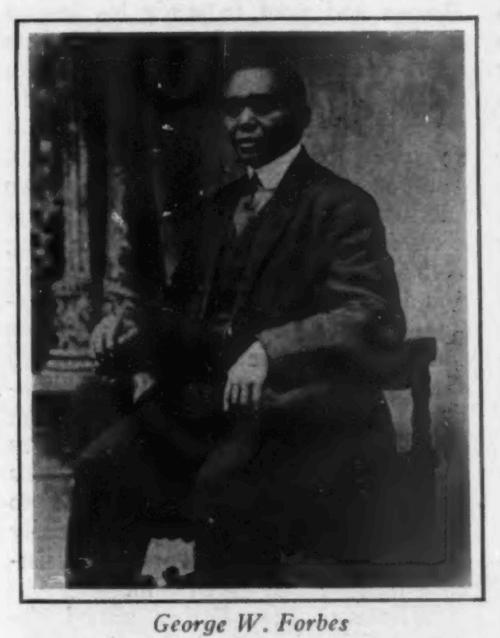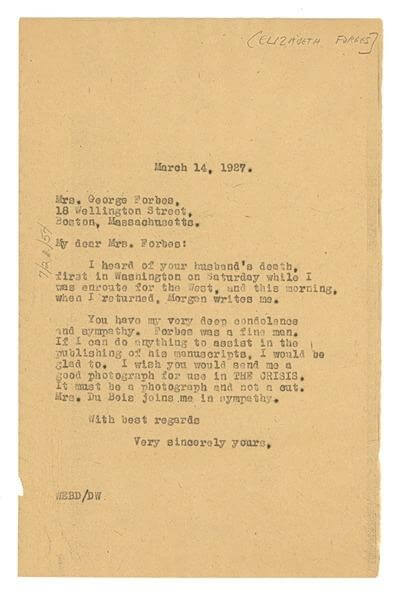George Washington Forbes
George Washington Forbes was hired by the West End Branch of the Boston Public Library when it opened in 1896, and thus became the first Black librarian working in the BPL system. At the West End Branch, Forbes served the neighborhood’s Black and Jewish communities until his passing in 1927.
George Washington Forbes was born in Shannon, Mississippi in 1864 to Sarah and William Forbes. His parents were formerly enslaved and emancipated in 1863. In 1878, when George was fourteen years old, he moved to Ohio and later enrolled at Wilberforce University, the first university to be owned and operated by African Americans. In the mid-1880s, Forbes moved to Boston and worked as a laborer for Harvard University, before enrolling at Amherst College and graduating in 1892. Forbes’s academic training prepared him to be a journalist with a strong literary background, as he edited the Boston Courant from 1892 to 1897. In 1896, George Forbes was hired as one of the first librarians for the West End Branch of the Boston Public Library, which opened that year on Cambridge Street. Forbes thus became the first Black librarian to work in the Boston Public Library system. At the West End Branch, Forbes served the children and adults of the West End’s Black community, and then the West End’s Jewish community after Black West Enders largely moved to the South End.
As a West End Branch reference librarian, Forbes assisted and mentored children and college students by locating books, helping students with difficult mathematics or grammar assignments (such as Latin translations), and offering practical advice. Forbes worked every evening, and every Sunday, with West Enders at the library’s many tables, in the library’s children’s room and reading room for adults. While at the West End Branch, Forbes continued his work in journalism by co-founding the Boston Guardian newspaper with William Monroe Trotter in 1901. Forbes left the paper in 1903, but he regularly wrote columns that were critical of the accommodationist philosophy of Black intellectual Booker T. Washington (Washington argued for acquiescing to segregation in order to pursue Black economic development; Washington conflicted with another Black intellectual, W. E. B. Du Bois, and his advocacy of prioritizing full citizenship rights for African Americans). After leaving the Guardian, Forbes wrote for magazines such as The Crisis, published by the NAACP and originally edited by Du Bois, and newspapers such as the Boston Transcript. He married Elizabeth Harley, from Kingston, New York, in 1900. In addition to working at the West End Branch, Forbes arranged the Theodore Parker Collection at the Central Branch (comprised of the books and papers of abolitionist Unitarian minister Theodore Parker) and had been working on a book that compiled biographies of notable African-American historical figures.
When the West End became a hub for Boston’s Jewish community at the turn of the twentieth century, Forbes became a role model for many Jewish West Enders who recalled how Forbes improved their performance at school. George Forbes worked at the West End Branch continuously until his death in 1927, a few days after he suffered a terrible bout of pneumonia. The West End Branch library received a phone call from Elizabeth Forbes notifying them that George had passed away, and the children who regularly visited the library raised their own funds to purchase flowers for the funeral. Fanny Goldstein suggested to the children that because they raised more than enough money to purchase flowers, they should use some of their funds to purchase a gift for George’s wife. George Forbes’ funeral took place on Sunday, March 14, 1927 at his home in the South End, and hundreds of people lined up down the street to pay their respects. On March 14, 1927, Du Bois sent a letter to Elizabeth Forbes offering his sympathy and a willingness to publish any of George’s books and articles in The Crisis provided that Elizabeth could send him a picture of George. After Forbes’ thirty-two-year career at the library, Fanny Goldstein sent a letter to Du Bois on April 1, 1927 that notified him of Forbes’ death and passed along an obituary from the Jewish Daily Forward, which Goldstein translated from the original Yiddish, for Du Bois to publish in The Crisis. Goldstein wrote:
My dear Dr. Du Bois:
It has been brought to my attention that you were a personal friend of George Washington Forbes, for many years an employee of the Boston Public Library, who recently passed away. Mr. Forbes was associated with this Branch Library for thirty-two years serving in the capacity of Reference Librarian, which brought him in very close touch with the Public, especially with the children. He was ever modest and faithful, and always gave to this Institution the best that was in him.
At the time of his death all the Boston papers commented on his very faithful service rendered these many years. Of all these obituaries, however, I think that the Yiddish press was even more than the Colored newspaper deeply appreciative and sympathetic.
In view of the fact that you were his friend and are connected with The Crisis, it has been suggested to me that you were be particularly interested in the enclosed translation which I am sending you of the article that appeared in the Jewish Daily Forward of March the 26th. This article, you will agree, is a splendid eulogy and a glowing tribute to this “hidden servant” from one race to another.
If Mr. Forbes’s life was simple, he was supremely happy in his work, and always gave of himself unstintingly. We may well say of him in closing “well done Thou good and faithful servant.”
Very respectfully yours,
Fannie [sic] Goldstein
W. E. B. Du Bois responded on April 25, 1927 that “I thank you so much for the translation of the Jewish Forward article on the late Mr. Forbes. We are going to use it. Very sincerely yours, W. E. B. Du Bois.” Elizabeth Forbes replied to Du Bois’s letter, on May 29, 1927, noting that she had been hired to a clerical position at the West End Branch “as a tribute to the memory of my husband,” and that Fanny Goldstein was “anxiously awaiting the number of the Crisis containing some mention of George’s passing.” The obituary was subsequently re-published as “George Forbes of Boston: A Servant of Jew and Gentile” in the July 1927 issue of The Crisis, with some introductory text from Du Bois. Du Bois recognized Forbes for his radical writings in the Guardian, particularly his critiques of Booker T. Washington; these contributions to Black journalism meant that “Forbes holds an important place in the development of American Negroes.” Du Bois introduced the obituary written by “M. Bender” for the Jewish Daily Forward with a note about the West End’s changing nineteenth-century demographics: “as Forbes formerly served his own people so now he served the Jews.” Du Bois, and Bender in the obituary, commended Forbes’ ability to bridge the Black and Jewish communities through his service to the West End Branch. Bender concluded that “his death is being mourned by the Negro population which was justly proud of him, but still more is he being mourned by the Jewish children of the West End of Boston.”
Article by Adam Tomasi
Source: Boston Public Library; Digital Public Library of America; The Crisis; Herbert Aptheker (ed.), The Correspondence of W.E.B. Du Bois, Volume 1 (1973)










